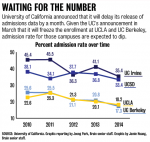The University of California said this week it will announce admission statistics a month late because it still does not know how many students it can afford to accept.
The statistics are usually released on the University website in April. However, the University said it is delaying the announcement because it wants to make sure its numbers are accurate.
The University announced in March it will freeze its resident enrollment at all campuses, as well as nonresident enrollment at UCLA and UC Berkeley. Officials said the enrollment freeze will happen if the state does not allocate additional funding the UC has said it hopes for.
Hans Johnson, a higher education researcher from the nonpartisan think tank Public Policy Institute of California, said he thinks the delay comes from the University trying to evaluate how many students it can enroll and accept from its waitlists.
The University can utilize waitlists to bring more students into the University if the state allocates more money, Johnson said.
UC campuses remain unsure about how to manage their enrollment and waitlists as they wait for the end of budget negotiations between the University and state, said UC spokesperson Dianne Klein in an email statement.
“Campuses are actively managing their lists,” Klein said in an email. “The numbers are still very much in flux.”
The University has proposed an increase in resident student enrollment contingent on a rise in UC funding, either in the form of state funding or from tuition. The University passed a proposal in November to increase enrollment by potentially hiking tuition by up to 5 percent annually for the next five years, depending on state funding.
However, Brown has said additional state funding would come to the UC only if tuition remains frozen.
UCLA has seen a 6.5 percent increase in the number of applicants this year, with more than 92,000 first-year and 20,000 transfer applicants. Because of the increase in applications and freeze in the university’s target enrollment, the percentage of applicants accepted is expected to dip.
The potential passage of bills that would limit enrollment for nonresident students may complicate the matter further, Johnson said.
Though nonresident enrollment will freeze at UCLA and UC Berkeley this year, it is expected to increase at other UC campuses.
Admission statistics have not been released, but many applicants have been surprised by the UC’s decisions, said Wei-Li Sun, a blogger on UC admissions and an admissions counselor who has worked with high school students for nearly a decade.
“Students felt like they had a good shot at one of the UC campuses, but were really surprised,” Sun said. “I have several high school valedictorians who were rejected or waitlisted at multiple UC campuses.”
She said she thinks delaying the release of admission statistics prevents students from understanding the University’s struggle to get more funding from the state.
“Being honest with students is probably better in the long term in retaining a good relationship with students,” Sun said.
Though the release of admissions information is delayed, UCLA said it will promptly notify applicants about their waitlisted applications.
UCLA spokesperson Ricardo Vazquez said UCLA will start accepting people from the waitlist by May and finalize its waitlist decision by June 1, the same as it has been traditionally.
Brown will release his revised budget sometime in May.
